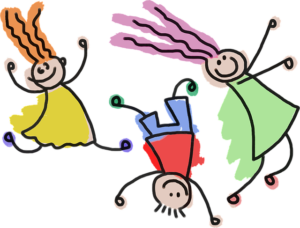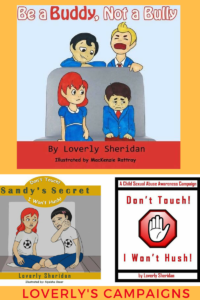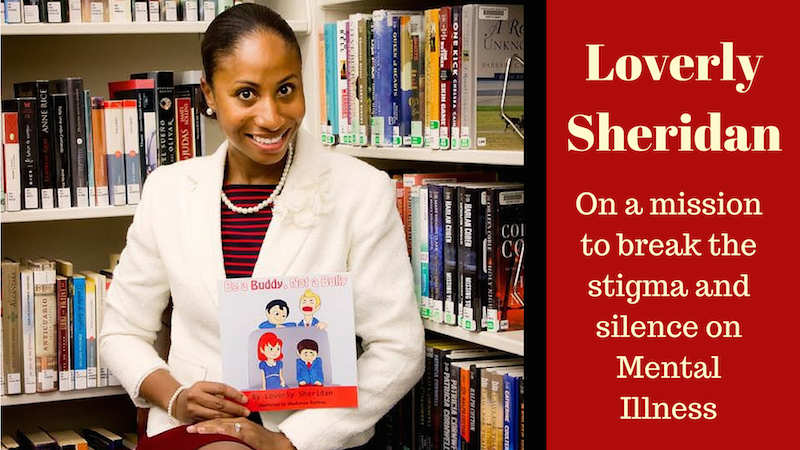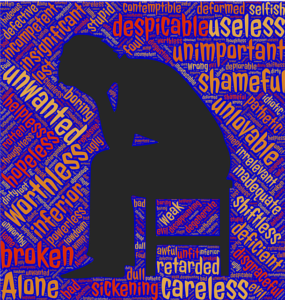Loverly Sheridan: Spotlighting Mental Illness, Shattering the Taboo
07/19/2016By:Monica Victor
Education and openness are key to achieving these goals
At the height of the Y2K phenomena in 2000 when panic, uncertainty and fears that computers would reset and shut down sending planes spiraling from the sky, consumed with anxiety I travelled from St.Lucia to Canada to reconvene the nanny job I started four months prior.
 The family had two kids. The baby was 2-years-old — calm, ‘well behaved’ and a darling. The 5-year-old I judged as being difficult, headstrong, troublesome — couldn’t sit her little derrière in one place. I later found out she was diagnosed with Attention Deficit Hyperactivity Disorder(ADHD). It was a disorder I had never heard about but the symptoms were similar to the behaviors the kids back home in St.Lucia exhibited when I was growing up. Symptoms we simply regarded as typical to children and referred to as ‘a kid being a kid’ except the troublesome and ‘hard headed’ ones we referred to as “bad”.
The family had two kids. The baby was 2-years-old — calm, ‘well behaved’ and a darling. The 5-year-old I judged as being difficult, headstrong, troublesome — couldn’t sit her little derrière in one place. I later found out she was diagnosed with Attention Deficit Hyperactivity Disorder(ADHD). It was a disorder I had never heard about but the symptoms were similar to the behaviors the kids back home in St.Lucia exhibited when I was growing up. Symptoms we simply regarded as typical to children and referred to as ‘a kid being a kid’ except the troublesome and ‘hard headed’ ones we referred to as “bad”.
A few months later I moved to the United States and landed a job this time caring for two little boys. It all seemed like déjà vu. The older boy was headstrong, difficult, challenging,a force to be reckoned with, a perfectiontionist and neat freak — his hair and socks had to be perfect and his clothes unsoiled even when playing outdoors. Helping with homework was a chore as he was often inattentive and easily distracted. As the years went by he too was diagnosed ADD (Attention Deficit Disorder).
The real life scenarios and anecdotes are endless
And then there’s this one — Obsessive Compulsive Disorder (OCD), that we use so loosely, so casually to attribute to germaphobes, people who are terrified of germs or wash their hands excessively, or the checkers who checks and rechecks to make sure that the door is locked for instance or that they turned the iron or toaster off, or the one’s where one misstep in their daily routine throws off their entire day. The National Institutes of Health(NIH) defines it as a “common, Chronic and long-lasting disorder in which a person has uncontrollable, reoccurring thoughts (obsessions) and behaviors (compulsions) that he or she feels the urge to repeat over and over.”
And there are those who for some reason or another be it illness or loss suffer from depression, anxiety and panic attacks crippling their wellbeing, their existence and ability to function and lead a “normal” and productive life.
If you live in the United States, you’ve probably been approached by one or noticed the homeless folks who stand at every street corner rain or shine panhandling, hustling and begging to make a buck to either satisfy their hunger or satisfy their vice. Data from NIH shows, 8.6 percent of the total homeless population are veterans who most likely suffer from PTSD (Post Traumatic Stress Disorder) — a disorder that develops in some people who have experienced a shocking, scary, or dangerous event. The data also says that the veteran population are higher risk experiencing traumatic brain injuries and Post-Traumatic Stress Disorder (PTSD), two substantial risk factors for homelessness.
Who could forget Andrea Yates, the mother from Texas who confessed to drowning her five children in their bathtub back in 2001. It was found that severe postpartum depression and postpartum psychosis were to blame. Postpartum depression is a mood disorder that make women feel extremely sad, anxious, and exhausted after giving birth making it difficult to care for themselves or for others.
These are just a few of the more than 200 classified forms of mental illness. The disorders are real and multifaceted but they all fall under one umbrella Mental Illness. An illness still so taboo that sufferers depending on their race and culture struggle with inner anxiety to avoid the outward stigma. Regarded as “crazy, lunatic, mad, bad, dangerous, coo coo, not 100% there, off” in many societies they are left to their own devices to just cope. The internal turmoil as the data shows if left untreated could have lasting, devastating and catastrophic effects on themselves and others. The cases can run from mild to severe where sufferers harm themselves and/or others. Which brings to mind the mass shootings in the U.S. where the perpetrators always seem to have had underlying mental health issues.
Mental illness is common and can affect anyone who has had excessive stress. Genetic factors, biochemical imbalances, or a combination of these regardless of age, color, creed and culture can also cause mental illness.
The World Health Organization(WHO) estimates that:
- 450 million people suffer from a mental or behavioural disorder.
- Nearly 1 million people commit suicide every year
- One in four families has at least one member with a mental disorder.
- In addition to the health and social costs, those suffering from mental illnesses are also victims of human rights violations, stigma and discrimination, both inside and outside psychiatric institutions.
Stigma perpetuates silence, silence perpetuates stigma
So what can we do to raise awareness of this very real and pervasive illness?
Loverly Sheridan, a St.Lucian author, child advocate, anti-bullying champion and Executive director of L.E.A.P., (Learning, Excelling, Applying and Persevering) understands the scope and magnitude of this mental illness and is intent on raising her voice and using her talent to break the silence and stigma, to move the needle from taboo to empowerment, for the betterment of society as a whole.
“The stigma of mental health illnesses, causes many to suffer in silence,” she says. “Some disorders go undiagnosed or are misdiagnosed which leads to other problems and cause people to take their own lives. This is more apparent now more than ever before. People who suffer from a mental health disorder often feel alone and unhappy. They are labeled, ridiculed, misunderstood and judged. It doesn’t help that some disorders are not taken as seriously and made fun of. For example: in any regular setting, when someone is hyperactive, it’s joked that they have ADHD, or when someone gets very angry, others joke that they are bipolar, not understanding the difficult challenges that people diagnosed with such disorders are forced to deal with.”
Loverly heeds the call…
Recently appointed to the Board of Directors for The Jerome Golden Behavioral Center, and Board of Directors for Mental Health Association of Palm Beach, Loverly says we cannot continue to ignore the existence and prevalence of mental illness in societies around the world. With proper care and treatment many individuals learn to cope or recover from a mental illness or emotional disorder. In order to get this help many have to get over the stigma and face this illness head on. But the fight against mental illness she says, should be an integrated effort between government agencies, families, mental health professional and citizens.
“As an author who writes books to help empower children and raise awareness on some of the critical issues affecting children, I realized how critical it was for me to raise awareness and help break the stigma on mental health illnesses because of the inadequate support and ailing approach to mental health,” she says. “People with mental health illnesses are treated inhumanely, often homeless, ignored, and are in desperate need of help. The mind is the greatest component of the human body, and if it’s not functioning as it should, we need to treat people with dignity, and get them the help that they deserve and need. We need to treat them with the same urgency and care as we would anyone with a physical illness, and demand that policy makers and social-service systems do more to ensure that their needs are met. There are so many people falling through the cracks because of bad policies, policies that are in desperate need of reform.”
WHO also advocates that we ensure, “more humane; treatments that help avoid chronic disability and premature death; and support that gives these sufferers a life that is healthier and richer – a life lived with dignity.”
Loverly hits the ground running…
“I recently attended the Mental Health of America Annual Conference in Alexandria Virginia. I heard from some very powerful speakers and authors who are advocating to help break the stigma and for policy reform, the Honorable Patrick J. Kennedy, a former member of the U.S House of Representatives and the nation’s leading political voice on mental illness, addiction and other brain diseases. He gave a compelling speech about the need for change and the importance of breaking the silence, to help end this vicious cycle. In his book, “A Common Struggle: A Personal Journey Through the Past and Future of Mental Health Illness and Addiction,” he speaks openly and candidly about his, and his families struggle with mental illness and substance abuse.
Kennedy asserts:
“A child’s Mental Health is just as important as their physical health. When a child is wounded, we take them to the doctor to get help; we need to adopt the same attitude towards children who suffer from mental health illnesses. We cannot keep ignoring the symptoms/signs and remain silent while children continue to suffer.”
His sentiments align with a Stamford study that found a link between childhood trauma and mental illness.
Loverly has seen that link firsthand
 “Through my National anti-bullying campaign, I also realized the link between childhood trauma and mental health illnesses, and the importance of speaking about these issues. When a child is abused in any way– physically, sexually, verbally or experience any form of trauma, they are often left to feel like they have done something wrong, or that they did something to deserve it, and they often choose to remain quiet about their abuse, which leads to greater problems later on in life. There are so many people who live with secrets or traumas which affect their behaviors and mental state, and are often labeled, when they are actually victims and survivors of the worse form of abuse.”
“Through my National anti-bullying campaign, I also realized the link between childhood trauma and mental health illnesses, and the importance of speaking about these issues. When a child is abused in any way– physically, sexually, verbally or experience any form of trauma, they are often left to feel like they have done something wrong, or that they did something to deserve it, and they often choose to remain quiet about their abuse, which leads to greater problems later on in life. There are so many people who live with secrets or traumas which affect their behaviors and mental state, and are often labeled, when they are actually victims and survivors of the worse form of abuse.”
Her efforts started long in advance. Loverly recently published a book to raise awareness on sexual abuse, “Sandy’s Secret, Don’t Touch, I Won’t Hush,” adding to her ongoing and highly successful anti-bullying campaign and book, “Be a Buddy, Not A Bully.”
“I knew that it was important for me to become an advocate and raise awareness on mental health illness to help break the stigma, and get people to talk about the issues out loud. As a society, we cannot continue to place bandaids on deep wounds, hoping it will go away. We need to create a culture where people can get the adequate help that they need without feeling embarrassed or stigmatized, and where speaking about mental health illness out loud is not taboo.”
Loverly says it is time to band together, spring into action to break the silence so that sufferers can get the treatment that they need. To read more on the very inspiring and passionate author and advocate who wears numerous hats, check out my in-depth interview with the lovely Miss Loverly Sheridan.
About the Author:
 Monica Victor is the executive producer of Manmay LaKay Magazine. She’s a copywriter, social media and reputations manager at a financial services company. Her writings there aim to help folks make good use of their dollars and sense. Her writings at Manmay LaKay Magazine seek to celebrate her fellow St.Lucians, to empower and inspire folks to live their dream, raise awareness on the diseases that afflict us, connect all St.Lucians globally and to keep her St.Lucian heritage alive. Email:monae76@gmail.com
Monica Victor is the executive producer of Manmay LaKay Magazine. She’s a copywriter, social media and reputations manager at a financial services company. Her writings there aim to help folks make good use of their dollars and sense. Her writings at Manmay LaKay Magazine seek to celebrate her fellow St.Lucians, to empower and inspire folks to live their dream, raise awareness on the diseases that afflict us, connect all St.Lucians globally and to keep her St.Lucian heritage alive. Email:monae76@gmail.com








